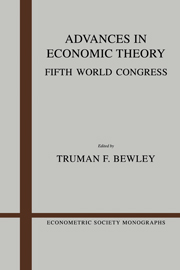Book contents
- Frontmatter
- 1 Auction theory
- 2 Game-theoretic analyses of trading processes
- 3 The theory of contracts
- 4 Battles for market share: incomplete information, aggressive strategic pricing, and competitive dynamics
- 5 A sequential strategic theory of bargaining
- 6 On the complexity of linear programming
- 7 Laboratory experimentation in economics
- 8 Increasing returns and the theory of international trade
- 9 Strategic aspects of trade policy
- 10 Equilibrium without an auctioneer
- 11 Arrow-Debreu programs as microfoundations of macroeconomics
8 - Increasing returns and the theory of international trade
Published online by Cambridge University Press: 05 January 2013
- Frontmatter
- 1 Auction theory
- 2 Game-theoretic analyses of trading processes
- 3 The theory of contracts
- 4 Battles for market share: incomplete information, aggressive strategic pricing, and competitive dynamics
- 5 A sequential strategic theory of bargaining
- 6 On the complexity of linear programming
- 7 Laboratory experimentation in economics
- 8 Increasing returns and the theory of international trade
- 9 Strategic aspects of trade policy
- 10 Equilibrium without an auctioneer
- 11 Arrow-Debreu programs as microfoundations of macroeconomics
Summary
Abstract: Increasing returns are as fundamental a cause of international trade as comparative advantage, but their role has until recently been neglected because of the problem of modeling market structure. Recently, substantial theoretical progress has been made using three different approaches. These are the Marshallian approach, where economies are assumed external to firms; the Chamberlinian approach, where imperfect competition takes the relatively tractable form of monopolistic competition; and the Cournot approach of noncooperative quantity-setting firms. This chapter surveys the basic concepts and results of each approach. It shows that some basic insights are not too sensitive to the particular model of market structure. Although much remains to be done, we have made more progress toward a general analysis of increasing returns and trade than anyone would have thought possible even a few years ago.
Since the beginnings of analytical economics, the concept of comparative advantage has been the starting point for virtually all theoretical discussion of international trade. Comparative advantage is a marvelous insight: simple yet profound, indisputable yet still (more than ever?) misunderstood by most people, lending itself both to theoretical elaboration and practical policy analysis. What international economist, finding himself in yet another confused debate about U.S. “competitiveness,” has not wondered whether anything useful has been said since Ricardo?
- Type
- Chapter
- Information
- Advances in Economic TheoryFifth World Congress, pp. 301 - 328Publisher: Cambridge University PressPrint publication year: 1987
- 6
- Cited by



